This post is adapted from Chapter 17 of Truth Is a Lonely Warrior.
Producing a One-World Religion: A Three-Step Plan
Karl Marx denounced religion as the “the opiate of the people,” and communist states tried extensively to abolish it. However, the Illuminist oligarchs who run most of our world know that man has a spiritual nature which cannot be fully eradicated. They therefore deemed it more practical to infiltrate and control religion than try and destroy it outright.
The basic mechanism underlying the satanic New World Order: consolidation. In the context of nations, this has meant ending national sovereignty – bringing Europe from the Common Market to the European Union, and North America from NAFTA to the proposed North American Union, eventually merging these regional structures into a one-world government. In the world of “big business,” a parallel consolidation process is taking place, as multinational corporations merge with each other and buy up small competitors.
The Illuminati also want consolidation of religions. The technical word for this is ecumenism, which comes from the Greek word “oikoumene” meaning “world” and “earth.” All avenues of life must be consolidated for the Antichrist to rule, and religion is no exception. British globalist historian Arnold Toynbee stated: “I believe that, in the field of religion, sectarianism is going to be subordinated to ecumenicalism, that in the field of politics, nationalism is going to be subordinated to world government . . . .”1
Of the many tasks to which the Rockefellers committed their vast fortune, one was ecumenical religion, which apparently required three steps:
- Degrade Christianity as a unique faith; this necessitated providing loans to major churches in exchange for doctrinal changes, and funding seminaries that would produce “Modernist” ministers who would undermine the faith. The subsequent weakening of Christianity would ultimately ripen it for consolidation with other religions.
- Specific organizations (such as the National Council of Churches) would be formed as the framework by which various denominations – and ultimately various religions – could be brought together under the ecumenical banner.
- To give churches motive for unification, social causes, acceptable within the morals of most denominations and religions, would be promoted as rallying points for “united action.”
Degrading Christianity
The Illuminati understood that Christianity would be difficult to incorporate into a world ecumenical movement, because Christianity has always been unique among religions – offering salvation not by good deeds, but faith in Jesus Christ through His finished work on the cross. An Illuminati goal, then, was to attack the authority and historicity of the Bible.
To this end, the Rockefellers heavily funded seminaries that would question the Gospel, the most notorious probably being Union Theological Seminary in New York City. It was Presbyterian theologian Charles Briggs – both a graduate and a professor of Union Theological – who, in the late 19th century, prominently introduced into America “Higher Criticism,” claiming the Bible was full of errors, and denying that many of its books were actually written by the attributed authors.


Above: Charles Augustus Briggs
In 1922, Baptist pastor Harry Emerson Fosdick, another graduate of Union Theological Seminary, delivered a controversial sermon called “Shall the Fundamentalists Win?” at the First Presbyterian Church of New York. In it, he cast doubts on: the Bible being God’s Word; the Virgin Birth; the Second Coming of Christ; and even Christ’s death on the cross serving as atonement for sins. And he denounced Fundamentalists – who held these beliefs – as “intolerant.”
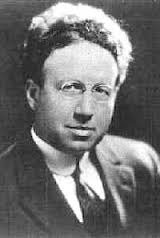


Harry Emerson Fosdick, who got MSM stamp of approval; Raymond Fosdick
The sermon sparked outrage. The General Assembly of the Presbyterian Church demanded an investigation of Fosdick, who was forced to resign his pastorship. However, he was then immediately hired as pastor of Riverside Church – the church attended and built by John D. Rockefeller, Jr. at a cost of $4 million. Rockefeller paid for 130,000 copies of Fosdick’s notorious sermon to be printed and distributed to Protestant ministers. Significantly, Fosdick’s brother Raymond was president of the Rockefeller Foundation for 12 years. The views expressed by theologians like Briggs and Fosdick were called “Modernism,” which also included denying Christ’s divinity, miracles and resurrection. In short, Modernism was not merely a quibbling over some gray area in a passage of scripture; it was a complete repudiation of the faith’s major tenets. And with Rockefeller backing, it made its way into seminaries, Christian colleges and churches across America. Modernism did not simply “happen”; it was an orchestrated, financed agenda.


John D. Rockefeller, Sr. with John D., Jr.; Riverside Church
Christians who opposed this movement were called “Fundamentalists” because they defended the fundamental doctrines the Modernists were assaulting.
Forming an Ecumenical Structure
In the Illuminati’s long view, once Modernism had sufficiently degraded Christianity into “just another religion,” it could be bonded with other faiths. But before achieving this last step, Christian denominations themselves had to be united.
The Federal Council of Churches (later called National Council of Churches) was founded in 1908. Heavily funded by the Rockefellers, it was to become the structural core of the drive to consolidate American Christianity. The man chosen to spearhead ecumenism was John Foster Dulles, an in-law of the Rockefellers. Dulles was the attorney who defended Harry Emerson Fosdick during his heresy investigation, and he served as chairman of the trustees of the Rockefeller Foundation, where Emerson’s brother Raymond was president.
At the 1919 Paris Peace Conference, which formed the League of Nations – first step toward world government – John Foster Dulles was legal counsel to the United States delegation. A founding member of the Council on Foreign Relations, Dulles contributed articles to the CFR’s journal Foreign Affairs beginning with its very first issue in 1922. An inveterate globalist, he eventually helped write the preamble to the United Nations Charter (which makes no mention of God). Dulles also chaired the Carnegie Endowment for International Peace, where his choice for president of that institution was Alger Hiss, the notorious communist spy who was secretary-general at the UN’s founding conference in 1945.
Part of Dulles’s religious agenda was to persuade American churches to accept world government. In 1937, he wrote in the magazine Religion in Life: “Where then does the solution lie? A theoretical solution lies in the abolition of the entire concept of national sovereignty and the unification of the world into a single nation. All boundary barriers are thus automatically leveled . . . .”2
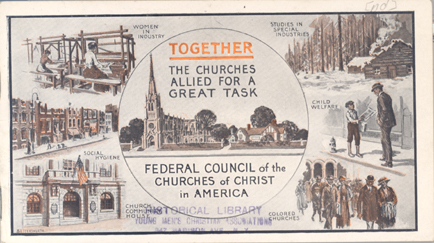
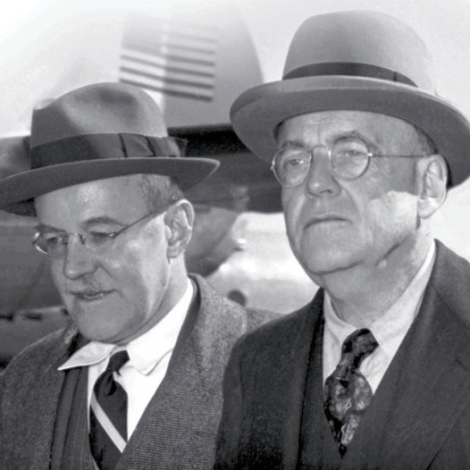
John Foster Dulles with his brother Allen (left), who served as both president of the Council on Foreign Relations and director of the CIA.
John Foster Dulles was on the executive committee of the Federal (later National) Council of Churches. In 1942, he chaired a meeting of 30 religious denominations brought together by the Federal Council of Churches, and Time (March 16 of that year) reported they adopted a program calling for “a world government of delegated powers,” “strong and immediate limitations on national sovereignty,” “a universal system of money,” and various other globalist measures.
Since the Illuminati ambition was not merely to consolidate churches in America, but throughout the planet, in 1948 the World Council of Churches was formed. John Foster Dulles attended the founding conference in Amsterdam. The conference’s director of research was John C. Bennett – member of the Council on Foreign Relations and president of Union Theological Seminary. Also attending was Reinhold Niebuhr (CFR, Union Theological). Funding for the World Council of Churches came from the Rockefeller and Carnegie foundations.

World Council of Churches founding conference, 1948
The Social Gospel: A Method for Implementing Ecumenism
Although the National and World Council of Churches provided structures for consolidation, the question remained of how to motivate churches to unite. Christian denominations often differ over various theological issues. But they generally agree on values (helping the poor and sick, for example). The strategy for unification, therefore, was to encourage them to collaborate where they did agree. This took the form of an action-oriented program known as “the Social Gospel.”
Walter Rauschenbusch, a Baptist minister trained at Rochester Theological Seminary – also funded by the Rockefellers – became a socialist and was known as “Father of the Social Gospel.” In 1893 – about the time Charles Augustus Briggs was initiating the U.S. Modernist movement – Rauschenbusch declared that “the only power that can make socialism succeed, if it is established, is religion.” He said that “Christianity is in its nature revolutionary,” denied that Christ died in substitutionary atonement for our sins, and said the Kingdom of God “is not a matter of getting individuals to heaven, but of transforming the life on earth into the harmony of heaven.”3

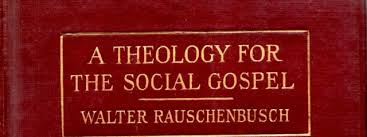
Walter Rauschenbusch
Perhaps the most notorious “Social Gospel” pusher was Rockefeller-backed Reverend Harry F. Ward, who taught for 23 years at Union Theological Seminary. Ward was also founding chairman of the American Civil Liberties Union (ACLU) – an ironic position, since the organization has been a dedicated opponent of religious displays on public property. Ward also chaired the American League against War & Fascism, which was founded by the Communist Party, USA. Manning Johnson, a former Communist Party official, told Congress in 1953 that Ward “has been the chief architect for communist infiltration and subversion in the religious field.”4 Union leader Samuel Gompers, founder of the American Federation of Labor, called Ward “the most ardent pro-Bolshevik cleric in this country.”5 (Note the irony of a clergyman supporting communism, an ideology that denounces religion as “the opiate of the people” and has slaughtered millions of Christians.)


Harry F. Ward
Ward’s Social Gospel was a push for ecumenism. He helped found, in 1908, the Methodist Federation for Social Service (now called the Methodist Federation for Social Action). Ward was its secretary for 33 years. In the Federation, the Gospel of Christ took a back seat to the Social Gospel, which called for Christians to fight for things like social justice, better labor conditions, and “world peace.” Not surprisingly, these were the same goals proclaimed by Marxists. Christians were thus to be united into a cheap volunteer work force for a socialist new world order.
Missionary work was not neglected. In 1930, at John D. Rockefeller, Jr.’s request, and with his financial support, a group of Baptist laymen persuaded seven denominations to participate in the “Laymen’s Foreign Missions Inquiry.” Their report, Re-Thinking Missions: A Laymen’s Inquiry after One Hundred Years, recommended that missionaries de-emphasize Christian doctrine and seek to ally themselves with other religions in doing good works.
The denominations distanced themselves from the report. However, Pearl Buck, author and former missionary to China, praised it in The Christian Century, saying every Christian should read it. In articles published in Harper’s and Cosmopolitan, Buck rejected the doctrine of Original Sin, and said that belief in the divinity – and even historicity – of Christ was unessential to the faith. She criticized the typical missionary as “narrow, uncharitable, unappreciative, ignorant.”6 In place of evangelization, she recommended that missionaries help with agricultural, educational, medical and sanitary work (i.e., the Social Gospel). In short, Pearl Buck’s pronouncements fit perfectly with the “modernized” ecumenical Christianity. It should not be overlooked that, subsequent to praising Rockefeller’s missionary inquiry, her novel The Good Earth was awarded the Nobel Prize in Literature and was turned into an Oscar-nominated movie.
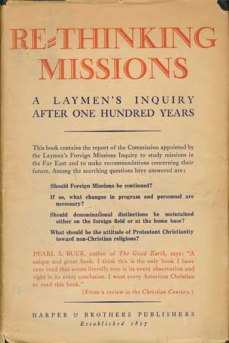

The “Re-thinking” report; Pearl Buck
RECENT YEARS: THE THREE-STEP PLAN CONTINUES
Degrading Christianity
The process begun by Charles Briggs, introducing “Modernism” with its attack on every fundamental of Christianity and the Bible, continues today.
One prominent assault on the Bible’s authenticity has been the Jesus Seminar, begun in 1985 by the late Robert Funk, with backing from the Westar Institute, whose financial supporters are not publicized. Funk packed his seminar with liberal “scholars” – more than a dozen had studied at Union Theological Seminary, and about half came from three liberal Establishment schools: Harvard and Vanderbilt (both of whose divinity schools were heavily funded by the Rockefellers) and the openly ecumenical Claremont School of Theology.
The Jesus Seminar used a system of colored beads to vote on whether something was really said or done by Jesus. A red bead meant “definitely yes,” a pink bead “probably yes,” a grey bead “probably no,” and a black bead “definitely no.” In short, the Bible’s historical accuracy was to be determined by votes, based on personal opinions of people living two thousand years after the original eyewitnesses to the events.
The seminar concluded that over 80 percent of the sayings attributed to Jesus were not actually said by Him, and that only 2 percent were definitely accurate. Likewise, the seminar followed Modernist tradition by denying the miracles, divinity an resurrection of Jesus. Funk, who himself held these views, had handpicked his seminar’s participants; thus its outcome was no surprise. Nonetheless, the media touted the proceedings as a “scholarly” refutation of most of the New Testament.

Additionally, a slew of “documentaries” aimed at casting doubts on the Bible have aired on TV. These typically spend most of their air time interviewing Modernist theologians rather than conservative ones. The documentaries have aired prominently on:
- the History Channel (owned by A & E Television Networks, a joint venture of groups with CFR fingerprints: Disney-ABC Television Group, NBC International, and the Hearst Corporation);
- the National Geographic Channel (owned by CFR member Rupert Murdoch’s Fox Cable Networks and National Geographic Television); and
- the Discovery Channel (which, in 2005, hired as its managing editor Ted Koppel – former CFR member and good friend of CFR heavyweight Henry Kissinger).
Although The Da Vinci Code is cast in the mold of an historical mystery – much like the “Indiana Jones” movies – its punch line is an assault against Christian faith. It is rife with false assertions regarding the early church. Despite thorough refutation by church historians, many people, caught up in the hype, accepted The Da Vinci Code’s disinformation as fact. At the heart of its message: Jesus was not divine, was never resurrected, and married Mary Magdalene and had children by her.
Lo and behold, within months of the film’s release, the Discovery Channel aired a documentary claiming a tomb had been found containing the bones of Jesus and Mary Magdalene. This was not a chance sequence. Media events are being orchestrated to deceive the public.


The Ecumenical Structures Grow
The National Council of Churches (encompassing 37 Christian faith groups) and World Council of Churches (representing 345 churches, denominations and Christian fellowships) continue today. They have been reinforced by such organizations as Christians Uniting in Christ (established in 2002) and Christian Churches Together in the USA (formed in 2006).
Not to be missed is the Tony Blair Faith Foundation. Yes, the former British Prime Minister – a consummate insider who recently refused to speak at a world hunger conference because it could not meet his speaker’s fee of 330,000 pounds – has formed another ecumenical organization. Blair might be compared to John Foster Dulles, the globalist politician who helped form the World Council of Churches. On the foundation’s website, Blair stated:
I launched the Tony Blair Faith Foundation to promote respect, friendship and understanding between the major religious faiths . . . . I have always believed that faith is an essential part of the modern world. As globalisation pushes us ever closer it is vital it’s not used as a force for conflict and division. . . . Rather, faith is something that has much to give and to teach a world in which economic globalisation and political change is offering many opportunities but also presenting many dangers.7Note Blair’s emphasis on globalization and his desire for unity among all faiths. Behind the fuzzy talk about “respect, friendship and understanding” is an aim for one-world religion – which the Antichrist will require to rule the globe. In fact, the Antichrist probably couldn’t have said it much better.
The New Social Gospel: Today’s Methods for Implementing Ecumenism
What is used to motivate today’s churches to unite? As before, it’s social action. Just as Marxist pastor Harry F. Ward headed the Methodist Federation for Social Action, the website for Tony Blair’s Faith Foundation originally had a section called “Social Action Projects.” Viewers were asked to sign a declaration which stated: “I commit to working together with people of all faiths to fight against disease and poverty.”
In short, it’s not about what you believe – social action should transcend your faith, so that it can be melded with all the others.
In America, the push for ecumenical social action has been spearheaded by Rick Warren, pastor of Saddleback Church in Lake Forest, California. He is perhaps best known for his book The Purpose Driven Life, which by 2007 had sold over 30 million copies. Many churches were persuaded to join Warren’s “Purpose-Driven” movement because his book topped the New York Times bestseller list and he was featured on MSM shows such as Good Morning America. After all, didn’t this prove Warren was anointed by God? Somehow, where other evangelical spokesmen had failed, Warren had penetrated the anti-religious bias of America’s mainstream media. CNN even called him “America’s Pastor,” and Barack Obama invited him to give the invocation at his inauguration.
The true reasons for Warren’s bursting on the scene suggest something besides God’s anointing. Warren is a member of the Council on Foreign Relations. He has distinct ties to media tycoon Rupert Murdoch, whose empire includes the Wall Street Journal and England’s The Times. Warren’s book The Purpose Driven Life was published by Zondervan, a division of HarperCollins, which has been owned by Murdoch’s News Corporation since 1989. Murdoch also controls Fox, which produces the viciously anti-Christian TV show Family Guy; and he owns pornographic channels in Europe. Yet Rick Warren was quoted in The New Yorker as saying that he is Rupert Murdoch’s pastor.8 If so, Christians have been asking, why does he not influence Murdoch away from his anti-faith, anti-family programming?


Once one realizes that Rick Warren is intimately connected to a man who is arguably the world’s most powerful media magnate, and that both have been CFR members, Warren’s rising star becomes more fathomable.
While many Christians have criticized Warren for his theology and for his use of questionable Bible translations, his most disturbing attribute may be ecumenism. In 2008, helped by a $2 million donation from Murdoch, Warren launched the PEACE Coalition. Time magazine reported the initiative with the headline “Rick Warren Goes Global.”9 The organization’s website states that “The plan is a massive effort to mobilize 1 billion Christians to attack the five global, evil giants of our day – spiritual emptiness, self-centered leadership, extreme poverty, pandemic disease and illiteracy/education.” Once again, behind idealist language lies a plan for an ecumenical world. Would it be healthy for Rick Warren to preside over an empire of a billion Christians?
Warren’s PEACE coalition was an obvious complement to the Tony Blair Faith Foundation. Not surprisingly, Warren was on the Religious Advisory Council of Blair’s foundation. On the latter’s website, Warren stated: “The vision and values of the Tony Blair Faith Foundation are desperately needed when every major issue in our world is influenced for good or harm by faith factors.”10
As America’s point man for ecumenical social action, Rick Warren might be called the Harry F. Ward of today. Unlike Ward, Rick Warren does not praise communism – which, as an ideology, is considered passé. But like Ward, his coalition plan would forge churches into a volunteer (i.e., unpaid) army in the service of the globalist, socialist new world order.
Adding yet more fuel to the ecumenical fire is the 2009 Manhattan Declaration. Though intended to appeal to conservative Christians, with its anti-abortion, traditional-marriage, religious-freedom proclamation, it is highly ecumenical. The declaration states: “We, as Orthodox, Catholic, and Evangelical Christians, have gathered together in New York on September 28, 2009, to make the following declaration . . . .” One of the three men on the declaration’s drafting committee was Robert George – a CFR member who serves the UN on UNESCO’S World Commission on the Ethics of Scientific Knowledge and Technology. A signer of the Declaration is Richard Land, then President of the Southern Baptist Convention’s Ethics & Religious Liberty Commission – and a CFR member. A major ecumenist, Land also signed the 1994 document Evangelicals and Catholics Together, and is a member of the Leadership Group on U.S.–Muslim Engagement – a role he shares with several other CFR members, such as Stephen Heintz, president of the Rockefeller Brothers Fund.
An Analogue in Catholicism
The Rockefellers, as “Baptists,” made non-Catholic churches their zone of influence. However, parallels exist in Catholicism, on whom pressures tend to emanate more from European than American sources.
The Catholic Church has had its own experience with attempts to degrade faith through Modernism: pressures to reject the authority of Scripture, to compromise with Darwinism (as prominently advocated by the priest Pierre Teilhard de Chardin), to accept abortion, and to ordain women and homosexuals as priests.
Like the non-Catholic church, the Catholic Church has recently seen major ecumenical developments, such as: the signing of the Joint Declaration on the Doctrine of Justification by Lutheran and Catholic representatives (1999); dialogue with Eastern Orthodox churches, resulting in the Common Declaration of Pope Benedict XVI and Ecumenical Patriarch Bartholomew I (2006); an unprecedented Catholic-Muslim summit at the Vatican (2008); and visits of Pope Benedict XVI to Israel and to the Great Synagogue of Rome (2009). Pope Francis is also prioritizing ecumenism, and has issued a 192-page encyclical on climate change, a cause which globalists view as a major pretext for world government.
And Catholicism has experienced its own “social action” movement – comparable to the tactics of Harry F. Ward – as in the doctrine of liberation theology, which was seen especially in Latin America beginning in the 1950s and 60s, where the Gospel took a back seat to fighting poverty and social injustice via Marxist precepts.
Unity and Discernment
Unity is a complex matter. The Apostle Paul did say to be “Endeavoring to keep the unity of the Spirit” (Ephesians 4:3) and “to be likeminded one toward another according to Christ Jesus” (Romans 15:5).
Furthermore, we know that a satanic strategy is to “divide and conquer.” At the signing of the Declaration of Independence, Benjamin Franklin famously warned his peers that “We must all hang together, or assuredly we shall all hang separately.”
So has Satan’s goal been to unite the church or divide it? It appears that he has employed both strategies, but that essentially division was the first phase and ecumenism the second.
Intelligence analysts have cogently argued that:
- The Illuminati were behind nearly every major split in the Christian church – beginning with the Catholic-Orthodox division of 1054.
- Illuminati infiltrators in the Catholic Church spawned the Inquisition to deliberately alienate Christians from their faith.
- This infiltration was also responsible for the 16th-century Papal corruptions – such as selling indulgences and squandering the church budget – that resulted in the Protestant split. Martin Luther, while himself a sincere reformer, was encouraged by Illuminati seeking church division.
- The Protestant church was in turn infiltrated to split it into smaller and smaller denominations, ostensibly over doctrinal issues – some less essential to the Gospel than others. Unquestionably, many of those who argued for division were sincere in their beliefs, and truths can probably be found on both sides of most doctrinal rifts. But Satan held the long view: divide to conquer.
Charles Taze Russell, founder of the Witnesses, and Joseph Smith, founder of the Mormons, were both Freemasons. Early issues of The Watchtower – the Witnesses’ official publication – bore the Freemasonic cross on their covers.


Compare the cross in this Masonic meeting hall to the one on the Watchtower.
Russell is buried next to the Greater Pittsburgh Masonic Center. A pyramid, displaying a Masonic cross, marks his grave:

Masonic symbols also adorn Mormon temples. An all-seeing eye crowns the entrance to the Salt Lake City temple:

According to some researchers such as David Icke, initial funding for both the Jehovah’s Witnesses and Mormons originated with Rothschild banks. These sects did not “just happen,” but were created to confuse and splinter the Christian church.
From the perspective of the twenty-first century, it appears that the strategy of division has now essentially completed its season. With the church successfully fragmented, and disoriented by Modernism, it appears nearly ripe for the Illuminati’s final phase: ecumenism – the uniting of all Christian denominations, in turn to be merged with other faiths, to create a one-world religion over whom Antichrist can rule.
However, this does not mean churches should never stand together. For example, if several local pastors, from different denominations, wish to engage in a joint protest against abortion, nothing is inherently wrong with this. Discernment is called for. Is unity for the purpose of serving God – or of serving Satan’s ecumenical goal? Examine the hearts and motives of those calling for unity. And follow the money: efforts tied to Rockefeller-Murdoch-Warren-Blair initiatives should be absolutely avoided.
Part 2 of this post will address an equally pernicious and even more controversial step in the war on Christianity: infiltration and subversion of the Fundamentalist/evangelical churches themselves, especially through the introduction of Christian Zionism.
NOTES
- “One World Is Coming Says Arnold Toynbee,” The Milwaukee Journal, May 2, 1964, 10.
- John Foster Dulles, “The Problem of Peace in a Dynamic World,” Religion in Life, Vol. 6, No. 2 (Spring 1937): 197, as quoted in Alan Stang, The Actor: The True Story of John Foster Dulles, Secretary of State 1953 to 1959 (Belmont, Mass.: Western Islands, 1968), 98.
- “Walter Rauschenbush,” Wikipedia, http://en.wikipedia.org/wiki/Walter_Rauschenbusch
- Ronald J. Lawrence, The Marxist Goliath Among Us: The David We Need to Be (Xulon Press, 2010), 319.
- LeRoy F. Smith and E. B. Johns, Pastors, Politicians, Pacifists (Chicago: The Constructive Educational Publishing Co., 1927), 95, quoted in Alan Stang, The Actor: The True Story of John Foster Dulles, Secretary of State 1953 to 1959 (Belmont, Mass.: Western Islands, 1968), 48-49.
- “Fundamentalist-Modernist Controversy,” Wikipedia, http://en.wikipedia.org/wiki/Fundamentalist%E2%80%93Modernist_Controversy
- At the time of publication of Truth Is a Lonely Warrior (2013), this quote appeared in “Message from Tony Blair” at http://www.tonyblairfaithfoundationus.org/page/message-tony-blair. The quote has since been removed.
- Malcolm Gladwell, “The Cellular Church,” The New Yorker, September 12, 2005, http://www.newyorker.com/magazine/2005/09/12/the-cellular-church
- David Van Biema, “Rick Warren Goes Global,” Time, May 27, 2008, http://content.time.com/time/nation/article/0,8599,1809833,00.html
- Warren is no longer listed on Blair’s site, but the quote can still be found abundantly on the Internet.